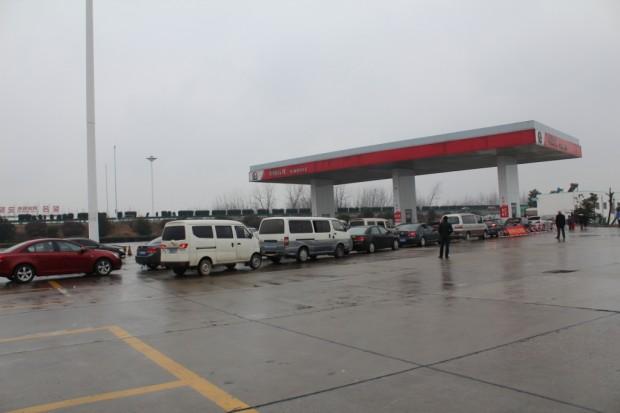Traveling Home for the Chinese New Year, By Car
The line for gas at a rest stop in Anhui Province. (Photo: Rebecca Kanthor)
China is in the midst of a 40-day period known as Chunyun, when migrant workers head home for the Chinese New Year. More than 3.4 billion trips are expected to be taken this year, most by bus, train or plane. But Rebecca Kanthor and her Chinese husband decided to follow a new trend. They’re driving home for New Years. Here’s Rebecca’s story.
Every year as Chinese New Year approaches, I brace myself. Visits to my husband’s home in Henan province, in the middle of China’s countryside, usually involve an uncomfortable train ride, crowds of people, and public bathrooms best not to mention. With our 7-month-old baby along for the ride, I wasn’t looking forward to this year’s trip.
That is, until my husband suggested we take the 500-mile journey by car. Here was a chance to take a road trip, China-style. He wanted the adventure of the open road. I just wanted a little leg room.
Our neighbors give us a warm send off. They examined the tomato-red Buick hatchback on loan from my husband’s work, and they checked out our daughter’s car seat, a rare sight in China.
The road stretches ahead of us, but the hazy pollution makes it hard to see much of anything else.
Driving is still a novelty here. My husband is just one of the legions of new drivers flocking to the roads, and China is building rest stops to accommodate them. Mr. Chen is the manager at a rest stop in Anhui province.
“I’m seeing many more privately driven cars,” says Mr. Chen, who doesn’t want to give his full name. “As people get richer they want to enjoy a better quality of life. Everything’s getting better, the roads are better and their salaries are better. So it’s only natural that people want to buy a car.”
The rest stops cater to these new drivers. You can pick up local snacks like stinky tofu and sticky rice dumplings. A crude loudspeaker in the parking lot reminds visitors to please park inside the parking spaces.
Carpooling with family and friends can actually be more economical than buying train or plane tickets. This year, for the first time, the government is suspending highway tolls during the official week of Chinese New Year.
Liu Shu Jun, a lawyer from the same town as my husband’s, has gone home for New Year’s for the first time in five years. He drove the 20 hours from southern Shenzhen almost non-stop, so eager to get there that he nearly fell asleep at the wheel. But if he had taken the high speed train, the same trip would have only taken eight hours – so why put himself to all the trouble?
“To be honest, driving home I’m much more content. It’s more comfortable,” he says. “Taking the train in China, how shall I say this? The rail system has a lot of room for improvement. There are just too many people. If I was by myself I would have taken the train, but this time, I brought my brother and his family home as well.”
Others are driving as a last resort. A tired-looking man with disheveled hair tells me all the train tickets were sold out, so he’s driving the 1,200 miles to see his family in far western Qinghai province.
For my husband Liu Jian, driving home not only makes economic sense, he wants the experience too.
“I can see a lot of things that I couldn’t see on the train – mountains, rice fields, corn fields, scenery I couldn’t see in Shanghai,” he says. “It feels more free. You can leave anytime you want. And I’m happy because I’m in control. When you take the train, someone tells you when to leave and when to stop. I like driving home better. I’m enjoying this.”
Singing along in the car to Bob Dylan and Chinese rock star Xu Wei, we cross the Yangtze River. Gone are the rice paddies; instead, we pass wheat fields with mounds of dirt marking grave sites.
As we near our exit, we get the feeling that the brand new expressway hasn’t seen much traffic. Villagers have taken over the breakdown lane, bicycling and walking along it, carrying New Year’s decorations.
After exiting the highway, we start off on the home stretch, until we hit a road block near a construction site. Some disgruntled migrant workers are holding up traffic to protest not getting paid. My husband manages to persuade them to let us through and we’re back on our way.
The further we get from Shanghai, the more my husband uses his horn. The increase in private cars is creating a new problem out here on these narrow dirt roads: traffic jams. With no traffic lights or police to direct traffic, we get stuck for almost an hour.
When we finally pull up to my husband’s home, my in-laws rush out to greet us. I see that driving home from the big city has another benefit. Although few would admit to it, it’s a sign that you’ve made it. Even in our borrowed second-hand car, we make a good impression.
Now we just have to make it back to Shanghai.
We’d love to hear your thoughts on The World. Please take our 5-min. survey.
